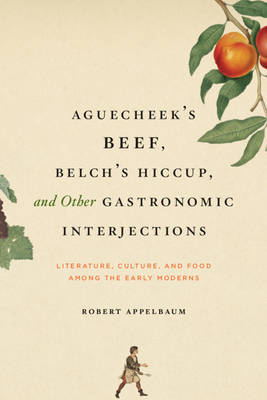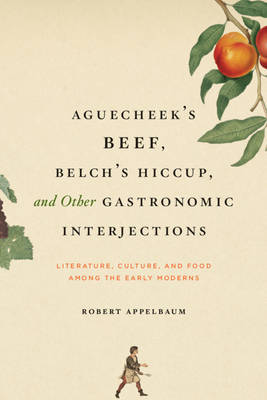
- Afhalen na 1 uur in een winkel met voorraad
- Gratis thuislevering in België vanaf € 30
- Ruim aanbod met 7 miljoen producten
- Afhalen na 1 uur in een winkel met voorraad
- Gratis thuislevering in België vanaf € 30
- Ruim aanbod met 7 miljoen producten
Aguecheek's Beef, Belch's Hiccup, and Other Gastronomic Interjections
Literature, Culture, and Food Among the Early Moderns
Robert AppelbaumOmschrijving
We didn't always eat the way we do today, or think and feel about eating as we now do. But we can trace the roots of our own eating culture back to the culinary world of early modern Europe, which invented cutlery, haute cuisine, the weight-loss diet, and much else besides. Aguecheek's Beef, Belch's Hiccup tells the story of how early modern Europeans put food into words and words into food, and created an experience all their own. Named after characters in Shakespeare's Twelfth Night, this lively study draws on sources ranging from cookbooks to comic novels, and examines both the highest ideals of culinary culture and its most grotesque, ridiculous and pathetic expressions. Robert Appelbaum paints a vivid picture of a world in which food was many things--from a symbol of prestige and sociability to a cause for religious and economic struggle--but always represented the primacy of materiality in life.Peppered with illustrations and a handful of recipes, Aguecheek's Beef, Belch's Hiccup will appeal to anyone interested in early modern literature or the history of food.
Specificaties
Betrokkenen
- Auteur(s):
- Uitgeverij:
Inhoud
- Aantal bladzijden:
- 376
- Taal:
- Engels
Eigenschappen
- Productcode (EAN):
- 9780226021270
- Verschijningsdatum:
- 15/06/2012
- Uitvoering:
- Paperback
- Formaat:
- Trade paperback (VS)
- Afmetingen:
- 150 mm x 226 mm
- Gewicht:
- 517 g

Alleen bij Standaard Boekhandel
Beoordelingen
We publiceren alleen reviews die voldoen aan de voorwaarden voor reviews. Bekijk onze voorwaarden voor reviews.







